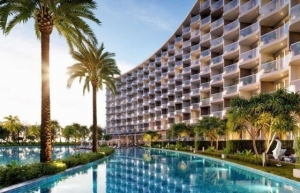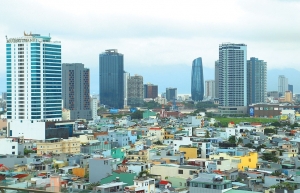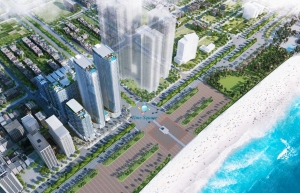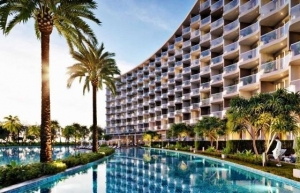Condotel conversion must avoid infrastructure pressure
Last month, Danang People’s Committee said it would approve the conversion of several condotels into apartment units, and developers will now be allowed to negotiate with homebuyers to cancel old condotel purchase contracts and re-sign contracts to buy apartments for residential use.
 |
| Condotel conversion must avoid infrastructure pressure, illustration photo/ Photo Le Toan |
One project affected by the move is the two towers of Danang Times Square, located opposite Bien Dong Park and My Khe Beach, after recognition that it boasted the conditions for mobilising capital last month. The project began in 2017 and was set to provide thousands of condotel units, expected to be handed over in 2019. The venture was frozen because of the pandemic, and the government had not yet permitted granting ownership for condotels.
Danang is also home to another project which was permitted to be converted into apartments for residence in 2022. The Empire resort and housing project, also known as Cocobay, has seen more than 1,000 out of 1,860 hotel apartments converted to apartments.
According to Thanh Do Investment Development and Construction JSC, the investor of Cocobay, the company issued and sent notices to buyers in March to liquidate condotel sale contracts and switch to receiving apartment units. Accordingly, buyers can choose to either receive the converted house, or get a refund of money previously paid.
So far, only Danang has reported official conversion of condotels into apartment units. Other active localities are Nha Trang in Khanh Hoa province, and Phu Quoc island in Kien Giang provinces. However, no specific project has yet been recognised for completion of their conversion process.
Le Van Tuan, vice director of Danang Department of Construction said the city ensures that the conversion of functions must be in accordance with urban planning, ensuring social and technical infrastructure indicators according to current standards and regulations.
“When carrying out any conversion in this manner, developers must adjust planning at all levels to ensure the project’s social infrastructure, green space, kindergartens, community houses, and parking lots are synchronised to the plans,” Tuan said.
While allowing thousands of condotel units to be converted into apartments for residents in Danang has been considered a temporary fix to address the condotel stockpile, social infrastructure planning could be disrupted.
Hoang Nam, director of Nam Viet Real Estate Consultants in Danang, said that relevant management agencies need to research and consider all aspects cautiously before approving a conversion.
“Conversions must not be approved overnight to prevent developers from rushing to convert condotels into apartments, and creating a bad precedent for urban planning,” Nam told VIR.
According to Nam, it is necessary to determine from the beginning that the condotel type is not a permanent residence but serves the purpose of tourism and short-term accommodation.
“Condotel investment does not require urban infrastructure or accompanying social infrastructure for the purpose of long-term residence of people. Therefore, once converting from condotel to apartment, there will be many problems that need to be resolved,” Nam said. “The conversion may bring a source of revenue for the immediate budget, but in the future it will be costly to reinvest in infrastructure, clearance, and urban depopulation.”
Architect Pham Phu Binh, vice president of the Vietnam Construction Consulting Association said, “The dense population as a result would surely bring an overload to the water supply, drainage, and electricity supply, not to mention the lack of schools, kindergartens, hospitals, and green parks.”
However, according to Binh, converting to apartments is convenient for investors so that they can have long-term ownership with certification, so it is easy for trading and attaining capital returns.
“Condotels still have prospects in the long term. Therefore, only parts of a certain project should be allowed to convert so that developers are supported through difficult periods but without putting too much pressure on urban infrastructure,” Binh added.
According to DKRA Group’s first quarter 2024 report, the condotel segment continues to face many difficulties in liquidity, with investor confidence as well as segment recovery still low.
In the first quarter, there were 45 condotel projects opened for sale, of which only two were new projects, with a supply of around 4,850 units. Overall market demand recorded the lowest level in the past five years, with the majority of projects showing slow sales. Some 90 per cent of condotel projects did not record any transactions in Q1.
| Mauro Gasparotti, director, Savills Hotels
The conversion of these condotels, where feasible, can undoubtedly bring certain benefits, such as increased market liquidity by allowing an ownership title that can be used as collateral and would enhance buyers’ protection regarding the possession of this property. This would be particularly advantageous for buyers who plan to use the unit as their holiday home. However, there are several additional considerations required for this change of ownership structure to be successful, and the viability of the conversion varies case by case. Firstly, it pertains to the intended business nature of the property, as it has a significant impact on the design, ultimately influencing the future utilisation of the property. When condotels have been designed as hotels or serviced apartments, the units are typically smaller, and both back-of-house and front-of-house facilities are tailored to accommodate short-term stays. In this case, the conversion into a residential project may not be practical, as the future use may not align with residential characteristics. Such properties usually require much more intense operating costs to function and are better suited to remain operating assets and perceived as investment products generating cash flow rather than a pure holiday home. Conversely, if these condotels have been designated and constructed as holiday homes, where buyers tend to use them as vacation properties or, in some cases, as their primary residences, the unit owners are much more likely to benefit from a residential conversion. In this scenario, if the buyers wish to lease out their property, their rental income is typically derived from long-term rentals rather than short-term stays. Condotels can be a decent real estate product, but they require clear business plans encompassing not only sales but also future building usage. Several products in the market have received inadequate consideration from developers in the planning stage regarding future use, leading to potential operational issues. For instance, poorly planned properties may experience undesirable performance rates due to a lack of central reservation systems and inadequate service planning, or they may suffer from insufficient building maintenance due to a lack of management regulations. We would recommend that local authorities actively engage with developers in the planning process to ensure that products are executed with proper business direction and alignment with provincial spatial planning as well as market demands. Winnie Lam, general secretary Hong Kong Business Association
The conversion is the next step in implementation from the government and investors. The authorities aim to facilitate projects with legal issues to revitalise urban landscapes, further recovering the real estate market. Meanwhile, businesses seek solutions for their condotel projects in terms of the issuance of land use right certificates and inefficient business operations. Repurposing buildings aligns with societal development needs, and this has been the approach in other countries. Many cities worldwide, such as Calgary and New York, have converted vacant office buildings into residential units to address their housing challenge, for example. However, any change in the building’s function will impact the overall planning, weighing on urban and social infrastructure, as well as population density. This also requires major and complex adjustments in design and techniques such as parking spaces, elevators allocation, lighting design, waste management systems, green spaces, and the allocation of social housing areas. Every property needs its end-users, as in the condotels needs visitors to operate efficiently. As the tourism industry grows in Vietnam, so do condotels because tourists need accommodation in and beyond just traditional hotels. While allowing condotels to convert into apartments is a welcomed first step in addressing the issue, it is important to thoroughly consider the needs of a specific commune as conversion into a different category is more suitable. The conversion of land use rights is a complex legal task that also affects general planning as well as the lives of local people. A sustainable and beneficial solution for not only condotels but also many other sectors in promoting local tourism, creating interesting and creative travel products to attract both domestic and international visitors is just as necessary as solving the housing crunch, for example. |
 | Condotels, officetels get ownership certificates from May 20 Owners of condotel apartments who fully satisfy the conditions under the land law, construction law and the law on real estate business shall be granted a certificate of ownership of land-attached construction facilities according to the commercial or service land area purpose. |
 | Revenue sharing going some way to ease condotel status The real estate market for resort villas and condos is showing signs of short-term recovery from a difficult period due to low liquidity. |
 | Overload caution sounded out over condotel switch More than 3,700 tourist apartments, which are part of the Times Square Danang complex, were converted into apartments by Danang People’s Committee in May, and are now causing concern about infrastructure overload both there and at future conversions. |
 | Land use rights for condotels remain stalled amid lack of thorough guidance Three months after a decree was issued to regulate land and housing rights certificates for condotels, additional guidance for relevant departments is still not forthcoming. |
What the stars mean:
★ Poor ★ ★ Promising ★★★ Good ★★★★ Very good ★★★★★ Exceptional
Related Contents
Latest News
More News
- Construction firms poised for growth on public investment and capital market support (February 11, 2026 | 11:38)
- Mitsubishi acquires Thuan An 1 residential development from PDR (February 09, 2026 | 08:00)
- Frasers Property and GELEX Infrastructure propose new joint venture (February 07, 2026 | 15:00)
- Sun Group led consortium selected as investor for new urban area (February 06, 2026 | 15:20)
- Vietnam breaks into Top 10 countries and regions for LEED outside the US (February 05, 2026 | 17:56)
- Fairmont opens first Vietnam property in Hanoi (February 04, 2026 | 16:09)
- Real estate investment trusts pivotal for long-term success (February 02, 2026 | 11:09)
- Dong Nai experiences shifting expectations and new industrial cycle (January 28, 2026 | 09:00)
- An Phat 5 Industrial Park targets ESG-driven investors in Hai Phong (January 26, 2026 | 08:30)
- Decree opens incentives for green urban development (January 24, 2026 | 11:18)



 Tag:
Tag:





















 Mobile Version
Mobile Version